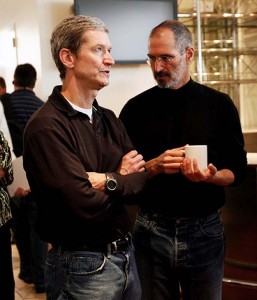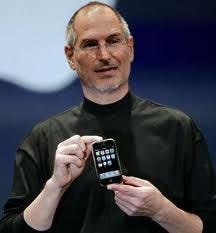To nobody’s surprise, it has finally happened. Steve Jobs has announced his resignation from Apple.
And while everybody wishes Jobs the best and admires him as perhaps one of the most visionary and, for sure, one of the most successful business people in American history, the question now remains, “What happens to Apple now?”
Well, the succession mystery that we have all debated for months was quickly answered, with COO Tim Cook rising to the role of Apple CEO. But this is only the beginning.
Will Apple’s success carry over under Tim Cook?
While a CEO change can be disruptive to any organization, there is actually research that indicates a shift at the top can bring about rapid — and sometimes much needed — change in the organization. However, this necessitates a vision or strong leader at the top, and we don’t know that this is Tim Cook. He’s obviously an operational genius with his success at such a behemoth as Apple. But we don’t know if this success will (or can) carry over to his role now as CEO.
In the case of Apple, the question of Cook’s leadership may not matter much for short-term market results.

I wrote back at the first of the year when the succession plan was such a topic that, “speculation about new products can build excitement and even demand in the marketplace. Speculation about leadership builds only concern and uncertainty.”
And that is apparently what has been happening. Apple today has profit margins of 24 percent. Their reported return on investment is nearly 42 percent, and earnings exist at an almost obscene growth rate, at least doubling in recent history. Yet the P/E ratio is low even with new products on the horizon.
It is my guess that the concerns regarding Apple and its future considering Jobs health have been around have been around long enough that the market has factored that uncertainty into the share price. As it turns out, that might have been the most beneficial move for the market at this moment.
The challenge in replacing Steve Jobs
That was uncertainty regarding Apple’s plans post-Jobs. Uncertainty about Apple’s plans going forward will continue to be a problem
In the short to mid-term, Apple should do fine. Or at least could be. Tim Cook is a long time insider and has been rumored to be Jobs successor since January when Jobs took a leave of absence.
At the same time, Jobs is about creativity and “the next big thing.” Cook is about operations. With a business the size of Apple, and with the recent move into a big “cloud strategy,” Cook may be just the person to get it done … from an operational standpoint.
But what about the other Apple management heavyweights now that Jobs is gone and Cook is in that spot? Software giant Bertrand Serlet has already left, and rumors have been going about designer Jonathan Ive for a long time. CFO Peter Oppenheimer was at one time considered a strong personality for the role and named a potential successor, as was Senior VP of Retail Operations Ron Johnson. Is Cook the kind of personality that can keep it all of this together?
The problem is that the storyline of Apple hasn’t been about its sharp and well-run operations — it’s been about its quirky, driven, difficult-to-work-for, but greatly loved founder and CEO Steve Jobs. Cook has the credentials, with his time at Compaq and IBM and then, for the last 13 years at Apple, with the last six as COO.
The big question: How rosy is Apple’s long term future?
Writer James Rogers says that investors shouldn’t fear Tim Cook. I agree. Tim Cook is not a fearsome being. But Steve Jobs was fearsome to his competitors and at times to his management team.
Steve Jobs was the icon of what it meant to work at Apple. With his departure, the future culture of the company is an open question. In the statement Jobs delivered as he resigned, he said that “Apple’s brightest and most innovative days are ahead of it.” It will be interesting to see if that’s true without the personality of Steve Jobs at the helm.
Back in 2009, I wrote for thestreet.com that Steve Jobs was one of those CEOs whose presence and experience brought security to investors and provided an identity to the company that pays off in financial results. I still believe this is true, which is why now Apple should expect some bumpy times in the market.
It is also true that things will likely smooth out for a while. But the long-term is not always rosy when the bigger-then-life leader leaves. Jack Welch left with General Electric stock at $50 (after a three-for-one stock split). Today it is $15.39. Whether his successor Jeff Immelt has done a good job or not, he never has been another Welch. It is doubtful that Cook will be another Jobs, and that may be his greatest challenge of all.
